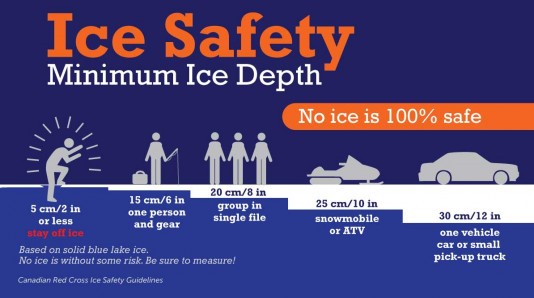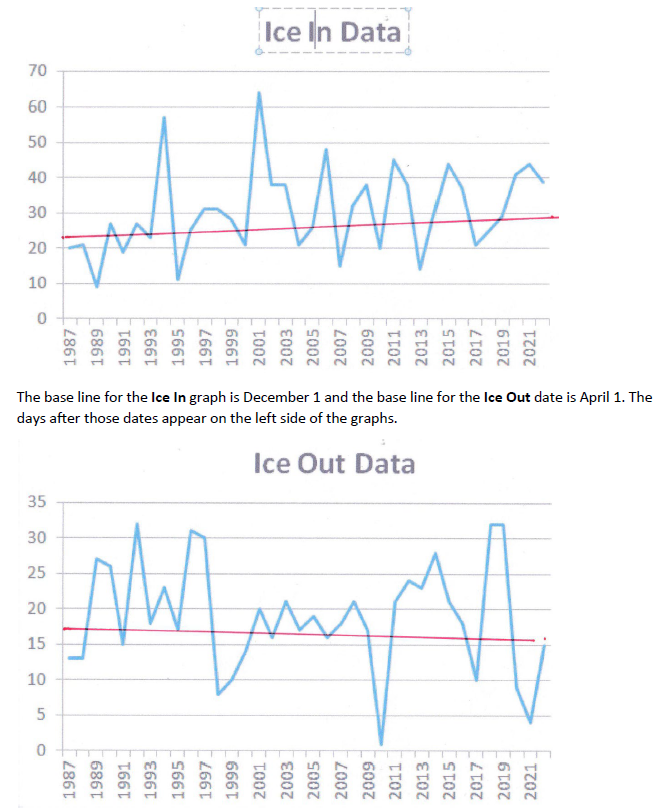
FOCA encourages everyone to enjoy the winter weather, safely. No ice is completely safe ice.

Our changing climate is changing ice coverage, which has impacts for lake health, and for personal safety. Read onward for information about safety, using bubblers, and the science around ice.
Falling through the ice:
Thank you to the Safe Boating Council for sharing this important video link on how to perform a self-rescue if you fall through the ice:
New to Cottage Country? Check out this post from CottageLink Rental Management, about ice safety reminders for those who may be newer to cottage country winters.
Learn more from the Canadian Red Cross about “When it’s safe to play” on the ice. Also, consult their ice safety graphic (click the image at the side to enlarge it):
Find more details about snowmobile safety further down this webpage.

October 2024 – Climate change is causing algal blooms in Lake Superior for the first time in history (The Conversation) – and see more below about climate and ice impacts, related to Dr. Sapna Sharma’s ongoing research at York University
Earlier News:
January 15, 2024 – CTV Northern Ontario reported a truck went through the ice while clearing a path to an ice fishing hut. The Ontario Provincial Police (OPP) and the Ontario Federation of Snowmobile Clubs (OFSC) remind snowmobilers that no ice can be considered 100% safe to ride on. This year’s late mild winter only increases the danger. Jump to more info, below, about snowmobile and ice safety.
February 2024 – Despite some days of wintry temperatures, unfortunately there have been several incidents reported on Ontario waterways in recent days, of people going through the ice.
February 2024 – You’re not imagining it: there really is much less ice on our waterways this Winter. In the image at the side, the red line is the historic average for the Great Lakes, while the dark black line is the actual 2023-2024 season-to-date. Past years from 1973 onward are shown in light purple. Track current conditions on the Great Lakes from the data-rich US National Oceanic and Atmospheric Administration (NOAA) Great Lakes Environmental Research Library (GLERL) webpages. (image: NOAA – GLERL at Feb.20, 2024)
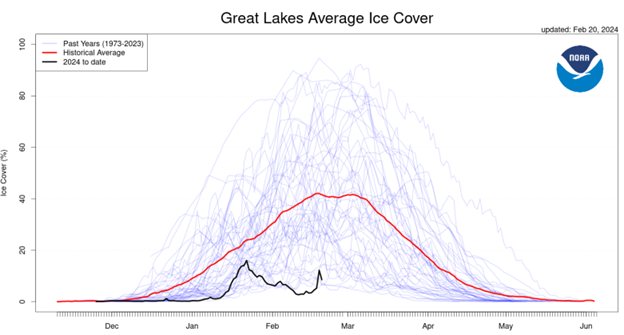
How is climate change affecting ice?
Many of FOCA’s member groups voluntarily track annual “Ice-Out” dates on their waterways. But are these dates changing over time? What would shorter ice coverage times mean to our lakes and the biodiversity that relies upon them?
Read articles quoting the scientific research of FOCA’s colleague Dr. Sapna Sharma of York University:
- June 2022 – Long-term ice phenology [ice freezing & thawing] records spanning up to 578 years for 78 lakes around the Northern Hemisphere (Nature.com)
- January 2022 – What loss of ice cover means for lake health (Cottage Life)
- November 20, 2020 – How climate change is making winter ice more dangerous (Veronica Penney of the New York Times, as published in the Star Tribune)
Watch the video recording of Dr. Sharma’s presentation at the 2021 Troubled Waters Forum, “On Thin Ice: Are Lakes Feeling the Heat?” (YouTube – see the video at the side)
See the Ice Out History of Lake Opeongo in Algonquin Park from the past 60 years.

Does anyone at your waterbody track the ice on and ice off dates, year-over-year? If not, you should! Dr. Nolan Pearce, a Post-Doctoral Fellow of the Trent University Department of Biology has a call-to-action for you:
“FOCA stewards: start recording these types of observations and upload them to open-access citizen science repositories, like NatureWatch’s “IceWatch”.
The value of long-term ice data is immeasurable for global change research, and while the best time to start collecting these data was 50 years ago, the next best time is now. Scientists can use your ground-truthed records to evaluate changes in ice thickness and composition (black and white ice) as well as the timing of when lakes freeze and thaw. You may also help your local scientist (me!) better understand winter lake processes occurring under the ice. If you happen to find yourself at the lake this winter, consider becoming a citizen scientist and document your observations.”
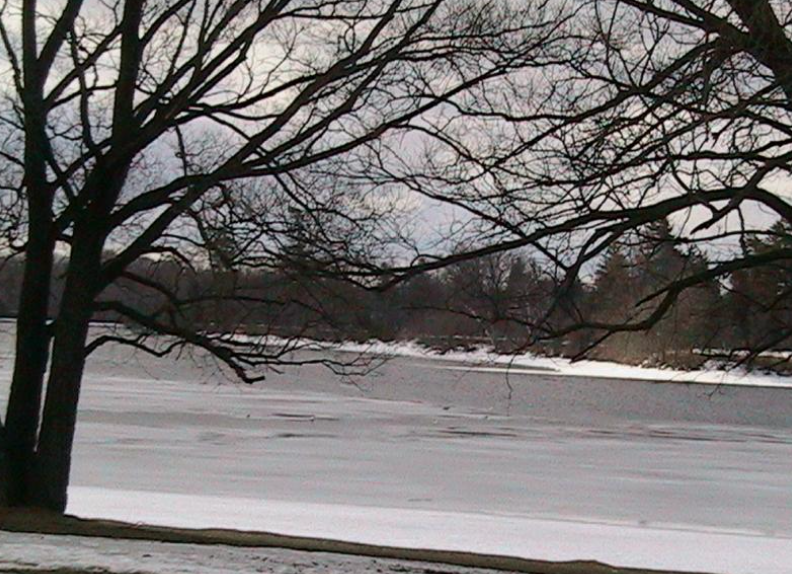
Member Spotlight: citizen scientist ice data collection
Bubblers - What property owners need to know:
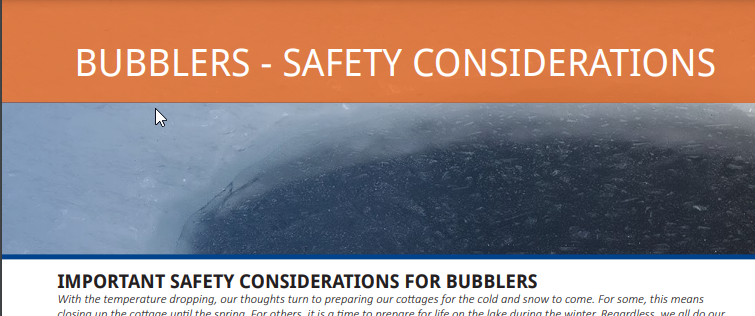
In the winter, some waterfront owners install bubblers – a type of de-icing system – intended to prevent the build-up of ice at or around waterfront structures like docks and boathouses. However, before you use a bubbler, you should learn about important safety and legal implications (see below for an info sheet). It is also important to check with your local municipality, as some have begun to implement bylaws that impact bubbler use.
- Read a 1-page overview about Bubblers (PDF) from FOCA’s risk management colleagues at Cade Associates Insurance Brokers.
On a related subject: while de-icers are intended to protect docks and boathouses from ice damage, improper use can actually create greater chance of ice damage. Read an overview on the subject, from a New Hampshire Lake Association. (Note: references are to American legislation about bubblers.)
Snowmobile Safety Tips:
The Ontario Provincial Police (OPP) and the Ontario Federation of Snowmobile Clubs (OFSC) remind snowmobilers that no ice can be considered 100% safe to ride on with a snowmobile. Whenever possible, snowmobilers are advised to stick to available, land-based, OFSC-Prescribed Trails.
If you do make the personal choice to take the risk of travelling on ice by snowmobile, wait until a marked stake line is in place and cross only when you can follow it directly from shore to shore, without stopping on the ice. While ice crossing is never a sure thing, snowmobilers can also reduce their risk by:
- Checking ice thickness and quality before riding onto any frozen water
- Understanding that ice conditions may vary from day to day, from hour to hour and from place to place
- Never travelling on ice alone, at night or while impaired
- Avoiding slushy ice, untracked ice, or ice near moving water or dock bubblers
- Watching out for obstacles like rocks, stumps, docks, ice roads and fishing huts
- Wearing a buoyant snowmobile suit and carrying ice picks
January 2021 – our colleagues at the OPP SAVE Team have some great snowmobile tips for safely enjoying the out-of-doors this winter. Click the links below to view each video:


Please note: the following is archival material, and some links to third-party resources may no longer be active.
March 22, 2021 – ‘Winter is vanishing’ from the deep waters of Lake Michigan (CNN)
January 26, 2021 – Great Lakes ice cover shrinks, with big toll on leisure, erosion, ecosystems (London Free Press)
For more about the impacts of a changing climate, visit FOCA’s webpage.

